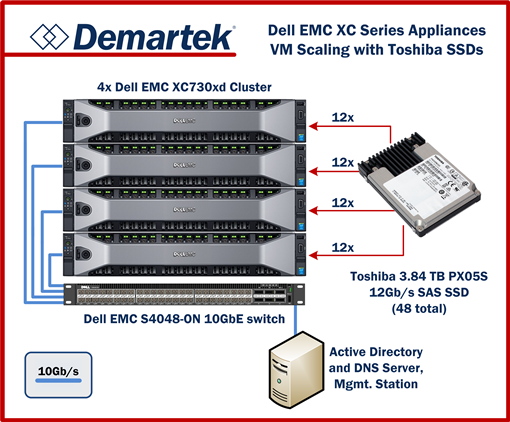Demartek Evaluation: Dell EMC XC Series Appliances VM Scaling with Toshiba SSDs
September 2017
Hyper-converged Infrastructure (HCI) is becoming a significant services platform in the datacenter, and with good reason. Abstracting processing, storage and network resources to create a fully software-defined datacenter is the logical progression of the decade-long virtualization trend. Companies like Nutanix are leading the way, enabling IT departments to create and expand application environments through the simple addition of common off-the-shelf servers. Eliminating the expense and complexity of deploying and managing a datacenter full of disparate devices with a mixture of management interfaces plus multiple networking and storage protocols makes it easy to deploy and support an on-premise cloud.
As one of the top providers of enterprise servers, the Dell EMC PowerEdge product line is a recognized standard when it comes to datacenter deployments. Powered by Toshiba PX05S 12Gb/s SAS SSDs, the PowerEdge platform is an ideal building block for a Nutanix private cloud. Dell EMC’s partnership with Nutanix extends to the XC series appliances — one and two rack unit PowerEdge servers certified specifically to support the Nutanix HCI solution.
Demartek deployed a four-node cluster of Dell EMC PowerEdge XC730xd servers to test the performance and scalability of Microsoft SQL Server workloads in a Nutanix Hyper-V environment. Nutanix managed in-chassis Toshiba PX05S SSDs provided the all flash software-defined storage layer serving I/O demands of the testbed. With three server nodes initially in an HCI cluster, baseline metrics were established and the number of virtual machines steadily increased. The fourth server was then added to the cluster and additional virtual machines installed to evaluate ease of use in growing and supporting a Nutanix cluster, and the performance impact, if any of doing so.

|


 We are pleased to announce that Principled Technologies has acquired Demartek.
We are pleased to announce that Principled Technologies has acquired Demartek.


